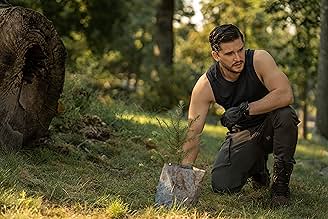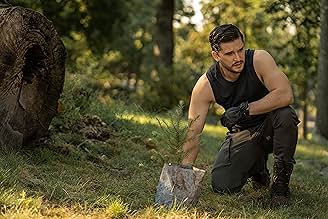Uma história inesperada de como as próximas mudanças em nosso planeta afetarão o amor, a fé, o trabalho e a família em escala pessoal e humana.Uma história inesperada de como as próximas mudanças em nosso planeta afetarão o amor, a fé, o trabalho e a família em escala pessoal e humana.Uma história inesperada de como as próximas mudanças em nosso planeta afetarão o amor, a fé, o trabalho e a família em escala pessoal e humana.
Explorar episódios
Avaliações em destaque
This series may not receive good reviews from acritical viewers, but it's an awesome piece of rhetoric worth watching, learning about & sharing... Here's why...
First, some context:
My first encounter with global warming was Rachel Carson's 1953 book "The Sea Around Us"- which I read when I was b/n 5 & 10 (around Regan's 1st term in DC.). My first experience with solar power was a house I was fortunate enough to call home when I was in junior high... in New England (pre-1990). That experience didn't resonate though until I arrived in Hawai'i in the early aughts- and rooftop solar was RARE. To say I've been mindful of climate change and environmental concerns for a while would be accurate- but it's only half of the story. The other part I've paid attention to is trends about climate change in news reporting, discourse and rhetoric- both within the US, globaly and around weather-related events which may make headlines for a while before giving way to whatever comes next. In addition to those 4+ decades of awareness, I recently read "Ministry for the Future" by Kim Stanely Robinson a month or two ago. While I haven't read the most recent reports from the UN, the IPCC or independent assessments of them (as of March 29th, 2023, anyway...), I remember watching the February 2022 UN IPCC briefing live, just days after Putin had invaded Ukraine. One final context tidbit: In the past week or two, the UN and IPCCC put out a new report. Though I can't speak to that most recent report- four episodes into this series, my impression is this series is, well, nailing it.
For additional context, I'm not a bookworm or armchair quarterback. I made a point to do as much traveling as I could before I turned 30: every US state except Alaska, an awesome experience backpacking in Europe pre-Euro, and even a "work" trip to the Middle East in 2007/08. Add to that motorcyclist, PADI certified and- regretably- 10 years into trying to recover from a spinal cord injury. (Meaning, over the past ten years, paying attention to the stuff I do has also functioned as a welcome distraction from my own hot mess.)
Given that context, here's what I think about Extrapolations S1:E1 - E4 (though I'll revisit this after the current season ends.)
Seriously.... Everything I've seen so far in the series makes sense. However, some viewers will feel awkward watching this series- by design. But that takeaway also makes sense: This is not comfortable, "happy, happy joy-joy" subject matter. It isn't designed to get laughs or to make people feel happy or good. As for technical merit, Judging by the pacing, cinematography, characters, lines, exposition and how different topics are being approached, I'd argue it's been designed to make people think... really think. (Judging by ratings, reviews and comments- this production is having an impact.)
As an earlier adopter type, online since 1991- I'm always trying to figure out what might happen *next* and have thoroughly enjoyed each episode so far. Again, the production quality is high- which helps, but I can totally imagine what others might think and how they might feel by watching this series- regardless of their relationship to climate change.
What will happens next in the series? I have no clue. But in the real world, I'm afraid nothing will change as much as it needs to until individuals change their behavior *and* the behaviors of businesses and governments, too. (And the sooner, the better.)
First, some context:
My first encounter with global warming was Rachel Carson's 1953 book "The Sea Around Us"- which I read when I was b/n 5 & 10 (around Regan's 1st term in DC.). My first experience with solar power was a house I was fortunate enough to call home when I was in junior high... in New England (pre-1990). That experience didn't resonate though until I arrived in Hawai'i in the early aughts- and rooftop solar was RARE. To say I've been mindful of climate change and environmental concerns for a while would be accurate- but it's only half of the story. The other part I've paid attention to is trends about climate change in news reporting, discourse and rhetoric- both within the US, globaly and around weather-related events which may make headlines for a while before giving way to whatever comes next. In addition to those 4+ decades of awareness, I recently read "Ministry for the Future" by Kim Stanely Robinson a month or two ago. While I haven't read the most recent reports from the UN, the IPCC or independent assessments of them (as of March 29th, 2023, anyway...), I remember watching the February 2022 UN IPCC briefing live, just days after Putin had invaded Ukraine. One final context tidbit: In the past week or two, the UN and IPCCC put out a new report. Though I can't speak to that most recent report- four episodes into this series, my impression is this series is, well, nailing it.
For additional context, I'm not a bookworm or armchair quarterback. I made a point to do as much traveling as I could before I turned 30: every US state except Alaska, an awesome experience backpacking in Europe pre-Euro, and even a "work" trip to the Middle East in 2007/08. Add to that motorcyclist, PADI certified and- regretably- 10 years into trying to recover from a spinal cord injury. (Meaning, over the past ten years, paying attention to the stuff I do has also functioned as a welcome distraction from my own hot mess.)
Given that context, here's what I think about Extrapolations S1:E1 - E4 (though I'll revisit this after the current season ends.)
Seriously.... Everything I've seen so far in the series makes sense. However, some viewers will feel awkward watching this series- by design. But that takeaway also makes sense: This is not comfortable, "happy, happy joy-joy" subject matter. It isn't designed to get laughs or to make people feel happy or good. As for technical merit, Judging by the pacing, cinematography, characters, lines, exposition and how different topics are being approached, I'd argue it's been designed to make people think... really think. (Judging by ratings, reviews and comments- this production is having an impact.)
As an earlier adopter type, online since 1991- I'm always trying to figure out what might happen *next* and have thoroughly enjoyed each episode so far. Again, the production quality is high- which helps, but I can totally imagine what others might think and how they might feel by watching this series- regardless of their relationship to climate change.
What will happens next in the series? I have no clue. But in the real world, I'm afraid nothing will change as much as it needs to until individuals change their behavior *and* the behaviors of businesses and governments, too. (And the sooner, the better.)
Extrapolations is a sci-fi series that tries to explore the consequences of climate change on human society and relationships. However, it fails to deliver a compelling story or engaging characters. The protagonists are one-dimensional and lack any depth or development. They act according to clichés and stereotypes, without any personality. The script is poorly written and full of plot holes, inconsistencies and logical flaws. Some scenes are so awkward and embarrassing that they make you cringe. The only redeeming qualities of this series are the cinematic scenery and the technical gadgets. The production values are high and the visual effects are impressive. The gadgets are creative and futuristic, but they cannot save this series from being a disappointment.'
What's the intent with this series? Initially, it seemed like it was designed mainly as a cautionary tale of what could happen in coming years if governments and mega-corporations continue doing what they're doing now, as the average planetary temperature continues to rise, causing all sorts of environmental havoc.
But at some point, this series morphs into just another sci-fi anthology, with very loose ties between episodes, and only a tangential link to the topic of climate change.
As the 'cautionary tale', the show was rather preachy, even for someone who is on board with the idea of a global crisis. And as the more standard sci-fi, there's nothing we haven't seen before -- and executed with far more panache, as in series like Black Mirror.
Some very big name actors have joined this project, but even they can't save what is, in total, a rather mediocre mini-series.
Not terrible, but not nearly as good (nor as powerful) as one might have hoped.
But at some point, this series morphs into just another sci-fi anthology, with very loose ties between episodes, and only a tangential link to the topic of climate change.
As the 'cautionary tale', the show was rather preachy, even for someone who is on board with the idea of a global crisis. And as the more standard sci-fi, there's nothing we haven't seen before -- and executed with far more panache, as in series like Black Mirror.
Some very big name actors have joined this project, but even they can't save what is, in total, a rather mediocre mini-series.
Not terrible, but not nearly as good (nor as powerful) as one might have hoped.
This series takes place in the near future and shows how climate change has affected the everyday lives of people of all classes. The planet is changing and this series shows some very important and interesting ways in how it is. It shows eight different stories and interweaves them all together. As most other people have already pointed out the cast is absolutely amazing. So many big name A list actors and actresses have signed on for this because it's about a subject that's important to us as human beings. You can tell the amount of money they put into this because it's a beautiful shot series and the attention to detail is incredible.
This series had a lot of potential and to be fair, it missed and achieved some of it.
The first episode is pretty preachy when it doesn't have to be so direct. They did some good world building but should have set up the story differently with better imagery and subtlety. The second episode by contrast has a much better vibe and feels exactly like what the rest of the episodes should have been, more or less.
Overall, it is worth a watch. At times it made me cringe because some of the writing was so cheesy. At other times I was impressed at how they showed some direct and indirect impacts of climate change on people's lives. It made me pretty emotional at times.
They need to make more movies and TV series like this. Using this series and the book Ministry for the Future could be a good foundation.
The first episode is pretty preachy when it doesn't have to be so direct. They did some good world building but should have set up the story differently with better imagery and subtlety. The second episode by contrast has a much better vibe and feels exactly like what the rest of the episodes should have been, more or less.
Overall, it is worth a watch. At times it made me cringe because some of the writing was so cheesy. At other times I was impressed at how they showed some direct and indirect impacts of climate change on people's lives. It made me pretty emotional at times.
They need to make more movies and TV series like this. Using this series and the book Ministry for the Future could be a good foundation.
Você sabia?
- CuriosidadesTodas as entradas contêm spoilers
- ConexõesReferenced in kuji: Ramiz Aliev: Exposing the Climate (2024)
Principais escolhas
Faça login para avaliar e ver a lista de recomendações personalizadas
- How many seasons does Extrapolations have?Fornecido pela Alexa
Detalhes
Contribua para esta página
Sugerir uma alteração ou adicionar conteúdo ausente









































